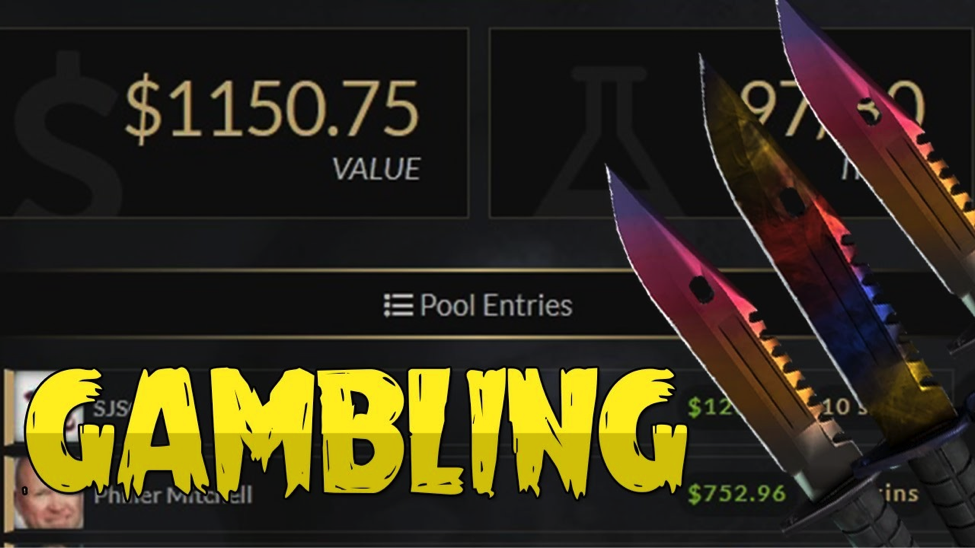

The debate of whether or not esports betting is legal is an ongoing issue that depends on your location in the world and that location’s regulations on sports betting, as well as online betting, both of which are widely in a gray area. Because of this, it is hard to know if and where esports betting is legal even in places that have ordinances and laws specifically regarding the activity. This is especially the case with quasi-gambling schemes like those involved in “skin-trading” in CS:GO.
In CS:GO, you can purchase keys that you can then use to unlock crates that have “skins” inside them. These skins can be used on knives and guns within the game. The keys cost real money, but the skins they give you are otherwise worth nothing. They are in-game vanity items. But since the introduction of these skins, separate websites have started a betting system that allows you to gamble using these skins, some of which now have a value of up to thousands of dollars each. Because of this, these websites have now created an unregulated, possibly illegal form of gambling surrounding CS:GO.
This addition of a “real” world economy to CS:GO has added new life to an older first person shooter, even more than TBS now hosting CS:GO live in Primetime, a move many have argued is making esports much more mainstream. But this introduction of betting on skins has sparked a large controversy as to whether or not it is properly regulated (it is not), and if it should be allowed to continue.
Because this betting doesn’t involve money, underaged betting is happening. But real money is in play here, as players often spend large amounts of money to acquire certain rare skins, which can then be lost in minutes. Plain and simple, it is gambling, and sites such as CS:GO Lotto allow anyone aged 13 and up to partake. And in 2015 alone, more than $2.3 billion worth of skins were used in online gambling, according to Bloomberg Businessweek.
The issue became much, much worse when it was discovered that two prominent YouTubers were caught rigging bets to promote a website they own, the aforementioned CS:GO Lotto. Trevor Martin (TmarTn) and Tom Cassel (ProSyndicate) were not only caught gambling on a site they own, which is a huge “don’t” in the gambling industry, but they were doing so in front of millions of YouTube followers, without disclosing that they were the company’s President and Vice President, respectively. And although match fixing isn’t completely unheard of in esports, individuals gambling on a site they own is completely unheard of, even in other forms of gambling.

Valve, while claiming to have nothing to do with this scandal, is still seen as partially responsible, as they collaborated with these betting websites to link the websites to players’ CS:GO accounts. Subsequently, Valve Corporation was included in a class-action lawsuit against the two owners of CS:GO Lotto. While Valve didn’t do anything, they allowed this gambling market to form, by allowing players to link their Steam accounts to said websites. The lawsuit was filed by an anonymous parent, on behalf of their child, an assumed underaged gambler.
The lawsuit has since been dismissed, on the grounds that because it was a federal court case, the only violations that the court could act on were insufficient to press charges. According to a court filing, "gambling losses are not sufficient injury to business or property for RICO standing." This refers to the Racketeer Influenced and Corrupt Organizations Act.
Valve Corporation sent out a cease and desist letter in July to 23 websites that facilitated skin gambling. As of July 30th (the day after the end of the 10-day compliance period), about half of those sites shut down for good. Six sites continued operating normally, seemingly ignoring the cease and desist altogether. The remaining six sites have either shut down with the intention to return, or simply disabled gambling on their websites. And as of today, a number of sites still allow you to gamble using CS:GO skins.
In the wake of this scandal, it only emphasizes the concern of esports betting. In fact, it offers a very real example of exactly how unregulated it is, and that many rules and regulations need to be formed and revised in order for it to function properly. Perhaps esports betting should be limited to certain outlets, such as physical locations. This would only make places like Las Vegas even more eligible to become esports hubs.
Although many of these sites are still operational, the scandal did serve as a huge eye-opener to esports organizations, players, and parents alike. Esports betting is not a practice that should be banned outright, but it does need more regulation and a solid set of rules, set aside from existing laws regarding sports betting and general online betting. Thankfully, there are a handful of websites that will responsibly tell you how to legally bet on esports.